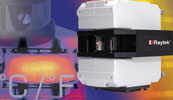

IR thermometers in plastics production.
In the plastics industry it is always difficult to do contact type temperature measurement due to the physical properties of the process. Thin polyethylene film, large high-speed plastic sheets and heated plastic prior to moulding are very difficult to measure by contact and it is normally an inferred measurement that is made.
It is possible to measure the entire sheet as it leaves the heated zone and make heater corrections as required. This measurement is performed with an infrared scanner across the sheet, which is then presented as a thermal image on a dedicated PC. This image can then be divided into user defined zones; digital or analogue outputs can then be used to control the heat distribution across the zones.
The system has built-in history capability along with software tools to interface to any existing system for quality monitoring or production counting.
Real-world applications
This type of scanner from Raytek has already been successfully implemented in many plastic process applications.
Warm punching of vinyl sheet is normally done at fast speeds making rapid response on temperature measurement and correction critical. Working at update speeds of less than 250 msec, makes the scanner far quicker than a standard thermocouple. Quality and less scrap product are among the benefits associated with the increased speed of response.
Extrusion coating of packaging material used to make liquid tight containers is another application for IR scanner scanning. The packaging material for carton based packages is composed of a laminate of paper, polyethylene and aluminium foil:
* Paper makes the packaging stiff.
* Plastic renders them liquid resistant.
* Aluminium foil blocks out light and oxygen.
The Polyethylene feeds through several extruders at temperatures up to 320°C; the melt is fed over wide slot die and laminated onto the paper. Temperature and viscosity variations in the local melt streams across the width of an extruder flow channel can cause waving edges, gaps, and edge-tears in the extruded film. The internal measurement of the melt temperature by use of thermocouples in the die is not necessarily representative of the temperature distribution across the polyethylene film at high production speeds – up to 700 m/min.
The use of an IR scanner has provided the following advantages:
* Faster response times (users get more information per time period).
* Measurements on objects that are moving, rotating or vibrating.
* No mechanical damage or contamination of the surface.
* Measurement on actual product (not another part of the process or an inferred measurement).
Considerations when using IR thermometers
Due to the increasing expectations of users and competition among manufacturers, infrared thermometers are continually being improved and electronic design is an area that has seen the most improvements recently.
Process industries continue to need sensors with higher accuracy and repeatability as they look for ways to cut costs, maximise their productivity and monitor quality. Easy installation, use, and maintenance continue to be important, as does the ability to withstand harsh environmental conditions.
Field checking and field calibration features are becoming more and more important as companies look to optimise their personnel and equipment resources. Manufacturers need IR sensors with a wide operating temperature range that covers more applications and eliminates the demand for water/air-cooled housing, which keeps the cost down due to less water/air consumption and hardware required.
Some important points to remember include:
* Must have direct line-of-sight.
* In general, IR thermometers measure only surface temperatures.
* The optics need to be protected against dust or condensation (a variety of accessories are available).
| Tel: | +27 11 608 1551 |
| Email: | [email protected] |
| www: | www.randci.co.za |
| Articles: | More information and articles about R&C Instrumentation |

© Technews Publishing (Pty) Ltd | All Rights Reserved